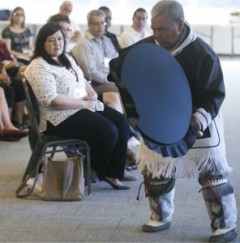Carleton University held a two-day pilot session in August of 2014 to prepare for a unique 5-day Summer Institute on Aboriginal Research Ethics planned for 2015. Using feedback collected through the pilot, Carleton University will be the first Canadian university to offer a professional institute to equip researchers of all kinds with tools to implement ethical practices when working with Aboriginal communities or conducting research on traditional Aboriginal

Inuk Elder David Serkoak performs a welcoming ceremony at the Carleton University Summer Institute on Aboriginal Research Ethics (photo: Chris Roussakis)
territory. “Positive action and change require research and we want to build an understanding of ethical best practices around the life cycle of Aboriginal research,” said Katherine Graham, senior advisor to the provost. “It is important that researchers have this in their tool kits.” The idea for the Institute came from a directive for the Aboriginal Education Council, a campus advisory group composed of community members and students, faculty and staff involved in the Indigenous community on campus. Through support from university administration, a development committee of university and community members was created to oversee the Summer Institute’s development. The pilot built off of the directives of Chapter 9 of the Tri-Council Policy Statement 2 (TCPS2, 2014) and other policies and protocols, including the United Nations Declaration on the Rights of Indigenous Peoples and community-based research ethics initiatives, such as the Kahnawake Diabetes Prevention Project.The Government of Canada’s Secretariat for Responsible Research provided $50,000 to support the development of the pilot. Some 30 academic and non-academic researchers and members of community organizations, as well as members of the Tri-Council, were involved in the pilot session to develop next year’s full program. The goal of the pilot was to to foster the responsible conduct of research related to the needs of Indigenous Peoples in Canada through multi-modal and multi-perspective training and through the instigation and facilitation of a vital community of practice by raising awareness about ethical considerations when conducting research with First Nations, Metis and Inuit people; engaging all parties in the research process; and bridge and where appropriate, integrate traditional and academic knowledge, methodologies and pedagogies within the CUIERIP curriculum so that the institute and ensuing research of participants is respectful, relevant and of the highest ethical standard. The focus of the curriculum was on: historical perspectives on research with Indigenous Peoples; relationship, reciprocity and community engagement; the contemporary ethics environment; the lifecycle of research and ethical considerations throughout. Pilot participants were given the opportunity to engage with the material in a hands on manner through the development of a research agreement. Participants reported that the found the Institute to have provided a respectful space that moved the dialogue surrounding Indigenous research ethics forward. The need for more balanced content among First Nations, Metis and Inuit perspectives was voiced, as well as for equal valuing of considerations from community and academic research ethics boards.
Building on the advances Aboriginal communities have made in governing their own research and the feedback received through the Summer Institute pilot, Carleton has the expertise and capacity to deliver a curriculum that will provide a solid grounding in regulatory awareness and compliance for all groups who seek it, including businesses, non-profits and non-governmental organizations, Indigenous communities and organizations, researchers, students, faculty and members of community and academic research ethics boards. The university’s goal is to share knowledge and maintain rigorous standards of cultural awareness as it seeks to expand its base to international researchers who engage in projects that directly affect Indigenous peoples in Canada. Supporting Aboriginal communities, promoting cultural awareness and positioning Carleton as a university of choice for Aboriginal students and faculty is a key goal of Carleton’s Strategic Integrated Plan.